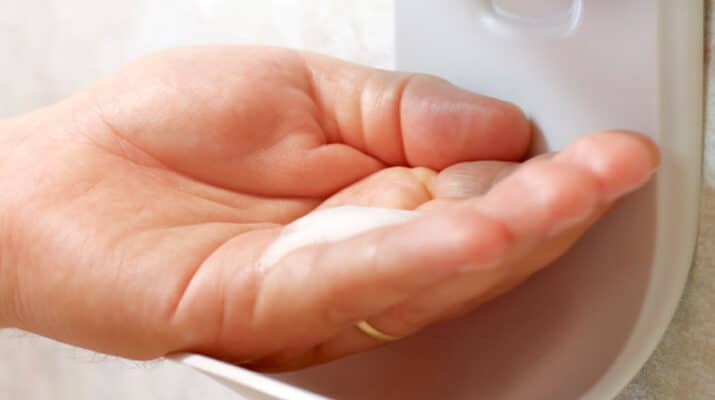By Deborah Jeanne Sergeant
For more than 18 months, much of the world has been slathering on hand sanitizer to protect against COVID-19.
That may not be a good idea.
A new study found in several brands of sanitizer high levels of “contaminants” — including benzene, a cancer-causing agent, according to the Centers for Disease Control and Prevention. The FDA has issued a list of sanitizer brands to avoid.
Valisure, a product testing company in Connecticut, examined 260 bottles of sanitizer from 168 brands and discovered that 17% of the samples contained detectable levels of benzene. Of those, 21 bottles contained levels of benzene above two parts per million. The FDA set that amount as a temporary measure to help supply sanitizer during the pandemic. Ordinarily, the FDA ranks benzene as too toxic for inclusion in personal care products.
Ramsey Farah, dermatologist with Farah Dermatology in Syracuse, said to simply “avoid the sanitizers on that list. Common sense dictates that if you have one on that list to not use it and get a different one. If possible, wash with water and soap. Use that as much as possible as a replacement for hand sanitizer if hand sanitizers are a concern for you.”
As an expert in dermatology, he stated that he does not see the hand sanitizer contamination issue as resulting in a rise in cancer.
“The amount of hand sanitizer getting into your body is pretty low,” he said. “Your skin is warm. Some harmful chemicals will evaporate away before absorbed. Some people are going to be at higher risk than others for absorption.”
He listed people in healthcare, who use hand sanitizer constantly. But those not using it repeatedly all day should have no concern about its use. Farah does not advocate abandoning use of hand sanitizer when hand washing facilities are not available. Lastly, a medical facility can perform a skin cancer check should there be any signs it might be needed.
Although sanitizing stations have become part of most public facilities, taking your own bottle from home can ensure you have a safe product to use.
Rich Pinckney, pharmacist at Rx City Pharmacy in Central New York, advises clients to properly wash whenever possible.
“We’re trying in the pandemic to keep everyone healthy and kill as many germs as possible,” Pinckney said. “If you can’t get to soap and water, which kills COVID for sure, hand sanitizers will kill it. You should still wash with soap and water.”
Washing all surfaces of the hands for a total of 20 seconds and rinsing should suffice.
Using sanitizer to try to scrub off soil uses much more of the product and is not as effective as washing for removing soil.
Reducing the amount of sanitizer used can help reduce exposure to any possible contaminants and minimize drying of the skin. The Centers for Disease Control and Prevention page on hand hygiene recommendations at www.cdc.gov/handwashing, which recommends using hand sanitizer of at least 60% alcohol content when soap and water are not available to clean hands.
Pinckney encourages those who use sanitizer—especially those who use it regularly—to seek a name brand.
Off brands could be sourced from countries not as stringent with ingredients as the United States, which means contaminants not deemed safe by the FDA could be present.

